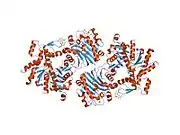Wiskott–Aldrich syndrome protein family member 2 is a protein that in humans is encoded by the WASF2 gene.[5]
This gene encodes a member of the Wiskott–Aldrich syndrome protein family. The gene product is a protein that forms a multiprotein complex that links receptor kinases and actin. Binding to actin occurs through a C-terminal verprolin homology domain in all family members. The multiprotein complex serves to tranduce signals that involve changes in cell shape, motility or function. The published map location[6] has been changed based on recent genomic sequence comparisons, which indicate that the expressed gene is located on chromosome 1, and a pseudogene may be located on chromosome X.[7]
Interactions
References
- 1 2 3 GRCh38: Ensembl release 89: ENSG00000158195 - Ensembl, May 2017
- 1 2 3 GRCm38: Ensembl release 89: ENSMUSG00000028868 - Ensembl, May 2017
- ↑ "Human PubMed Reference:". National Center for Biotechnology Information, U.S. National Library of Medicine.
- ↑ "Mouse PubMed Reference:". National Center for Biotechnology Information, U.S. National Library of Medicine.
- ↑ Suetsugu S, Miki H, Takenawa T (July 1999). "Identification of two human WAVE/SCAR homologues as general actin regulatory molecules which associate with the Arp2/3 complex". Biochem Biophys Res Commun. 260 (1): 296–302. doi:10.1006/bbrc.1999.0894. PMID 10381382.
- ↑ Suetsugu S, Miki H, Takenawa T (June 1999). "Identification of two human WAVE/SCAR homologues as general actin regulatory molecules which associate with the Arp2/3 complex". Biochem. Biophys. Res. Commun. 260 (1): 296–302. doi:10.1006/bbrc.1999.0894. PMID 10381382.
- ↑ "Entrez Gene: WASF2 WAS protein family, member 2".
- ↑ Miki H, Yamaguchi H, Suetsugu S, Takenawa T (December 2000). "IRSp53 is an essential intermediate between Rac and WAVE in the regulation of membrane ruffling". Nature. 408 (6813): 732–5. Bibcode:2000Natur.408..732M. doi:10.1038/35047107. ISSN 0028-0836. PMID 11130076. S2CID 4426046.
Further reading
- Jones GE (2000). "Cellular signaling in macrophage migration and chemotaxis". J. Leukoc. Biol. 68 (5): 593–602. doi:10.1189/jlb.68.5.593. PMID 11073096. S2CID 14783521.
- She HY, Rockow S, Tang J, et al. (1997). "Wiskott–Aldrich syndrome protein is associated with the adapter protein Grb2 and the epidermal growth factor receptor in living cells". Mol. Biol. Cell. 8 (9): 1709–21. doi:10.1091/mbc.8.9.1709. PMC 305731. PMID 9307968.
- Bear JE, Rawls JF, Saxe CL (1998). "SCAR, a WASP-related protein, isolated as a suppressor of receptor defects in late Dictyostelium development". J. Cell Biol. 142 (5): 1325–35. doi:10.1083/jcb.142.5.1325. PMC 2149354. PMID 9732292.
- Wu Y, Dowbenko D, Lasky LA (1998). "PSTPIP 2, a second tyrosine phosphorylated, cytoskeletal-associated protein that binds a PEST-type protein-tyrosine phosphatase". J. Biol. Chem. 273 (46): 30487–96. doi:10.1074/jbc.273.46.30487. PMID 9804817.
- Machesky LM, Insall RH (1999). "Scar1 and the related Wiskott–Aldrich syndrome protein, WASP, regulate the actin cytoskeleton through the Arp2/3 complex". Curr. Biol. 8 (25): 1347–56. doi:10.1016/S0960-9822(98)00015-3. PMID 9889097. S2CID 16661755.
- Qualmann B, Roos J, DiGregorio PJ, Kelly RB (1999). "Syndapin I, a synaptic dynamin-binding protein that associates with the neural Wiskott–Aldrich syndrome protein". Mol. Biol. Cell. 10 (2): 501–13. doi:10.1091/mbc.10.2.501. PMC 25183. PMID 9950691.
- Stewart DM, Tian L, Nelson DL (1999). "Mutations that cause the Wiskott–Aldrich syndrome impair the interaction of Wiskott–Aldrich syndrome protein (WASP) with WASP interacting protein". J. Immunol. 162 (8): 5019–24. doi:10.4049/jimmunol.162.8.5019. PMID 10202051.
- Morrogh LM, Hinshelwood S, Costello P, et al. (1999). "The SH3 domain of Bruton's tyrosine kinase displays altered ligand binding properties when auto-phosphorylated in vitro". Eur. J. Immunol. 29 (7): 2269–79. doi:10.1002/(SICI)1521-4141(199907)29:07<2269::AID-IMMU2269>3.0.CO;2-#. PMID 10427990. S2CID 13780011.
- Banin S, Gout I, Brickell P (1999). "Interaction between Wiskott–Aldrich Syndrome protein (WASP) and the Fyn protein-tyrosine kinase". Mol. Biol. Rep. 26 (3): 173–7. doi:10.1023/A:1006954206151. PMID 10532312. S2CID 36018089.
- Westphal RS, Soderling SH, Alto NM, et al. (2000). "Scar/WAVE-1, a Wiskott–Aldrich syndrome protein, assembles an actin-associated multi-kinase scaffold". EMBO J. 19 (17): 4589–600. doi:10.1093/emboj/19.17.4589. PMC 302050. PMID 10970852.
- Miki H, Yamaguchi H, Suetsugu S, Takenawa T (2001). "IRSp53 is an essential intermediate between Rac and WAVE in the regulation of membrane ruffling". Nature. 408 (6813): 732–5. Bibcode:2000Natur.408..732M. doi:10.1038/35047107. PMID 11130076. S2CID 4426046.
- Marchand JB, Kaiser DA, Pollard TD, Higgs HN (2001). "Interaction of WASP/Scar proteins with actin and vertebrate Arp2/3 complex". Nat. Cell Biol. 3 (1): 76–82. doi:10.1038/35050590. PMID 11146629. S2CID 30437883.
- Millard TH, Machesky LM (2001). "The Wiskott–Aldrich syndrome protein (WASP) family". Trends Biochem. Sci. 26 (3): 198–9. doi:10.1016/S0968-0004(01)01788-1. PMID 11246027.
- Worby CA, Simonson-Leff N, Clemens JC, et al. (2002). "Drosophila Ack targets its substrate, the sorting nexin DSH3PX1, to a protein complex involved in axonal guidance". J. Biol. Chem. 277 (11): 9422–8. doi:10.1074/jbc.M110172200. PMID 11773052.
- Miki H, Takenawa T (2002). "WAVE2 serves a functional partner of IRSp53 by regulating its interaction with Rac". Biochem. Biophys. Res. Commun. 293 (1): 93–9. doi:10.1016/S0006-291X(02)00218-8. PMID 12054568.
- Eden S, Rohatgi R, Podtelejnikov AV, et al. (2002). "Mechanism of regulation of WAVE1-induced actin nucleation by Rac1 and Nck". Nature. 418 (6899): 790–3. Bibcode:2002Natur.418..790E. doi:10.1038/nature00859. PMID 12181570. S2CID 4350733.
- Strausberg RL, Feingold EA, Grouse LH, et al. (2003). "Generation and initial analysis of more than 15,000 full-length human and mouse cDNA sequences". Proc. Natl. Acad. Sci. U.S.A. 99 (26): 16899–903. Bibcode:2002PNAS...9916899M. doi:10.1073/pnas.242603899. PMC 139241. PMID 12477932.
- Innocenti M, Zucconi A, Disanza A, et al. (2004). "Abi1 is essential for the formation and activation of a WAVE2 signalling complex". Nat. Cell Biol. 6 (4): 319–27. doi:10.1038/ncb1105. PMID 15048123. S2CID 22767022.
External links
- WASF2 human gene location in the UCSC Genome Browser.
- WASF2 human gene details in the UCSC Genome Browser.
This article is issued from Wikipedia. The text is licensed under Creative Commons - Attribution - Sharealike. Additional terms may apply for the media files.






